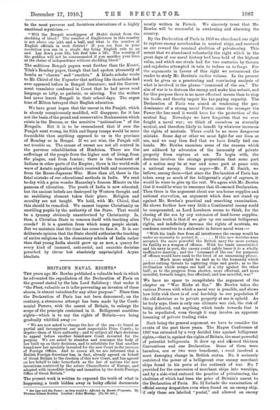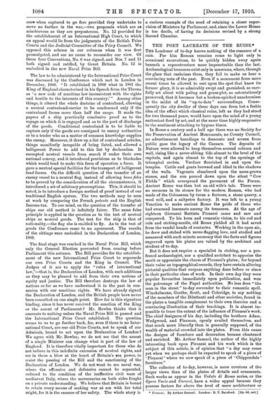BRITAIN'S NAVAL RIGHTS.*
TEN years ago Mr. Bowles published a valuable book in which he advocated the repudiation of the Declaration of Paris on the ground stated by the late Lord Salisbury : that under it "the Fleet, valuable as it is for preventing an invasion of these shores, is almost valueless for any other purpose." Since then the Declaration of Paris has not been denounced ; on the contrary, a strenuous attempt has been made by the Conti- nental Powers, with the assent of Britain, to enlarge the scope of the principle contained in it. Belligerent maritime rights—which is to say the rights of Britain—are being gradually whittled away :— "We are now asked to change the law of the sea—to brand as partial and incompetent our most respectable Prize Courts ; to deprive them of their authority ; and to subject all their decisions to appeal before another brand-new Court invented for the purpose. We are asked to abandon and renounce the body of law built up on their decisions, and to substitute for that another brand-new law specially invented for the new Court in the recesses of Foreign Offices. And to crown all, we are informed that a British Foreign Secretary has, in fact, already agreed on behalf of Great Britain to the erection of this new Court, and has agreed on her behalf to take henceforth as the law of nations the new inventions contrived by the astute Chancelleries of Europe, and adopted with incredible levity and incaution by the docile Foreign Office of Great Britain."
The present work is written to expound the truth of what is happening, a truth bidden away in bulky official documents * Sso LOAD and Ssa Power as May would bo Affactad b R.crat Proposala. By Thomas Gibson Bowles. London John Murray. Us. 6d. net'
mostly written in French. We sincerely trust that Mr.
Bowles will be successful in awakening and alarming the country.
By the Declaration of Paris in 1856 we abandoned our right to capture enemy merchandise in neutral ships, and received as our reward the nominal abolition of privateering. This meant that we abandoned voluntarily the right which in the great days of our naval history bad been held of the highest value, and which our rivals had for two centuries by threats and cajoleries attempted in vain to induce us to forgo. For the arguments in favour of this right we recommend the reader to study Mr. Bowles's earlier volume. In the present
work he gives us a penetrating and convincing analysis of what is involved in the phrase "command of the sea." The aim of war is to distress the enemy and make him submit, and
for this purpose there is no more effectual means than to stop his trade, and thereby impair his tax-paying capacity. The Declaration of Paris was aimed at weakening the pre- dominance of a strong naval Power, since the stronger the Power the less need it would have for the protection of the neutral flag. Nowadays we have forgotten that we ever fought a naval war ; we think of ourselves as eternally neutral, and therefore likely to, benefit by whatever increases the rights of neutrals. There could be no more dangerous mistake. Some day or other we must fight for our lives at sea, and we may then find that we have fatally tied out hands. Mr. Bowles examines some of the reasons which are adduced by advocates of the immunity of private property from capture at sea. To begin with, tha doctrine involves the strange proposition that some part of a nation may be at war and some part at peace with a national enemy. Some argue—Mr. F. E. Smith, we believe, among them—that since the Declaration of Paris has taken away so much of the belligerent's right of capture, it would be wiser to give up the rest. We agree with Mr. Bowles that it would be wiser to renounce that ill-omened Declaration. Then there is the argument about our sea-borne supplies and national starvation, an argument which does not stand up against Mr. Bowles's practical and searching examination. He shows further how very little a Continental enemy could be compensated, as Lord Loreburn seems to think, for the closing of the sea by any extension of land-borne supplies. The plain truth is that if we give up our ancient belligerent rights, and indefinitely increase the rights of neutrals, we condemn ourselves to a stalemate in future naval wars :-
"With his trade free from all interference the enemy would be, under no necessity to protect it. . . . . . If this new doctrine were accepted, the more powerful the British navy the more certain its futility as a weapon of offence. With his trade unrestricted and his navy in port, the enemy could safely leave it to a wholly. inoffensive mastery ; and the command of the sea' for purposes of offence would have sunk to the level of an unmeaning phrase.
Much more might be said as to the humanity which prefers cutting throats to capturing ships and goods ; as to the. civilisation which arrays one half of A city against the other half; as to the progress from shorter, more effectual, and more merciful, towards longer, less effectual, and less merciful, war."
We hare no space to recapitulate the argument of the chapter on "War Risks at Sea." Mr. Bowles takes the various Powers with which a naval war is possible, and shows how little risk there is of real hardship to our population if the old doctrine as to private property at sea is upheld. As he truly says, there is only one ultimate war risk, the risk of being defeated, and anything which tends towards that is to be repudiated, even though it may involve an apparent lessening of private trading risks.
Such being the general argument, we have to consider the events of the past three years. The Hague Conference of 1907 was animated by a very decided bias against belligerent rights,—that is, against the rights of Britain, the most powerful of potential belligerents. It drew up and affirmed thirteen Conventions and one Declaration. Some of them were harmless, one or two were beneficent, s .veral involved a
most damaging change in British status. No. 6 seriously restricted the power of a belligerent over enemy merchant
ships found in his ports at the outbreak of war. No. 7 provided for the conversion of merchant ships into warships, and by a side-wind restored the practice of privateering, the abolition of which had been the price of Britain's assent to the Declaration of Paris. No. 11 forbade the examination of official enemy despatches even when found on an enemy ship, if only these are labelled "postal," and allowed an enemy crew when captured to go free provided they undertake to serve no further in the war,—two proposals which are as mischievous as they are preposterous. No. 12 provided for the establishment of an International High Court, to which an appeal would lie from the judgments of the British Prize Courts and the Judicial Committee of the Privy Council. We opposed this scheme in our columns when it was first promulgated, and see no cause to reconsider our view. Of these four Conventions, No. 6 was signed, and Nos. 7 and 11 both signed and ratified, by Great Britain. No. 12 is embodied in the new Naval Prize Bill.
The law to be administered by the International Prize Court was discussed by the Conference which met in London in December, 1908. "It established in 1909 what in 1801 the King of England characterised in his Speech from the Throne
as new code of maritime law inconsistent with the rights and hostile to the interests of this country." Among other things, it altered the whole doctrine of contraband, allowing a neutral contraband-carrier to be condemned only if the contraband forms more than half the cargo. It made the papers of a ship practically conclusive proof as to the voyage on which it is engaged and as to the port of discharge of the goods. Conditional contraband is to be liable to capture only if the goods are consigned to enemy authorities or to a trader who as a matter of common knowledge supplies the enemy. Moreover, it drew up a list of contraband articles, things manifestly incapable of being listed, and allowed a belligerent Power to add to this list by declaration. It exempted neutral vessels from search if under their own national convoy, and it introduced provisions as to blockades which would tend to make this form of operation a farce. It gave a neutral special facilities for the transport of belligerent land forces. On the difficult question of the transfer of an enemy vessel to a neutral flag, instead of allowing bona fides to be proved by the consideration of all the circumstances, it introduced a set of arbitrary presumptions. This, it should be noted, is to introduce a foreign method of proof instead of our traditional English system. The two methods may be seen at work by comparing the French patents and the English Income-tax. To our mind, on the question of the transfer of ships our old method is infinitely fairer. The same false principle is applied in the question as to the test of neutral ships as neutral goods. The test for the• ship is that of nationality,—the flag she is entitled to fly. As to the test of goods the Conference came to no agreement. The results of the sittings were embodied in the Declaration of London, 1909.
The final stage was reached in the Naval Prize Bill, which only the General Election prevented from coming before Parliament this autumn. The Bill provides for the establish- ment of the new International Prize Court to supersede our own Prize Courts and the King in Council. The Judges of it are to apply the "rules of international law,"—that is, the Declaration of London, with such additions as they may be pleased to add from their own notions of equity and justice. The Bill therefore destroys the law of nations so far as we have understood it in the past in con- nexion with our maritime rights. We have already signed the Declaration of London, and the British people have never been consulted on one single point. How far is this signature binding, since it has never received the sanction of the King or the assent of Parliament ? Mr. Bowles thinks that it amounts to nothing unless the Naval Prize Bill is passed and the International Prize Court established. The question seems to us to go further back, for, even if there is no Inter- national Court, are our old Prize Courts, not to speak of our Admirals, bound to act upon the Declaration of London ? We agree with Mr. Bowles; we do not see that the assent of a single Minister can change what is part of the law of England. It is therefore vitally important for those who do not believe in this indefinite extension of neutral rights, and see in them a blow at the heart of Britain's sea power,-to resist the passing of the Bill and the sanctioning of the Declaration of London. We do not want to see naval war, where the offensive and defensive cannot be separated, reduced to the condition of the ineffective civil wars of mediaeval Italy, where the mercenaries on both sides fought on a private understanding. We believe that Britain is bound to retain every means of making war at sea with her total might, for it is the essence of her safety. The whole story is a curious example of the need of retaining a closer super- vision of Ministers by Parliament, and, since the Lower House is too docile, of having its decisions revised by a strong Second Chamber.























































 Previous page
Previous page